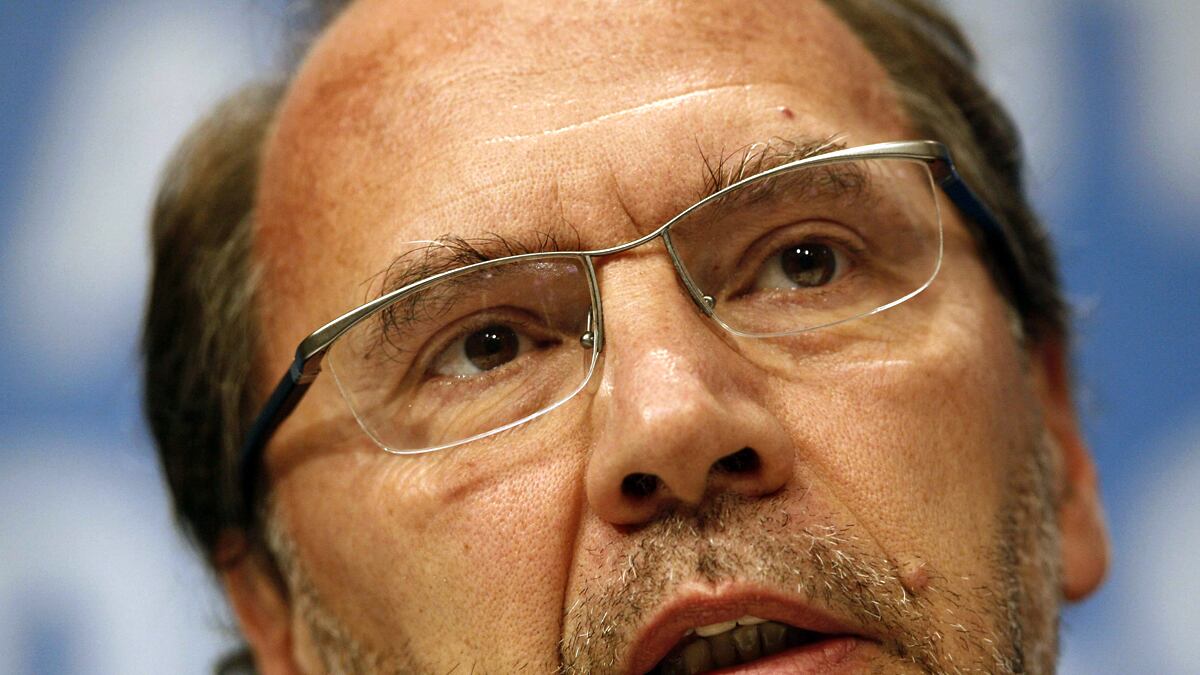Professor Baron Peter Piot, the Belgian epidemiologist who helped identify the Ebola virus and went on to lead the global fight against HIV/AIDS, takes a balanced view of Louis Pasteur’s remark that “the microbes will have the final word”: “It’s a race,” he said, when I met him at his office in the London School of Hygiene and Tropical Medicine, where he is the director. “Since the discovery of penicillin, and the discovery of anti-retroviral drugs, we are more or less ahead, but look at some of these super-resistant strains that are coming up. The doomsday scenario is that we will be confronted with untreatable bacterial infections—and it takes years and years to develop new drugs.”

Piot, a youthful-looking man of 63, estimates that he has seen 40 new viruses emerge in his career—some of them from uncomfortably close up. According to his new memoir No Time to Lose, which describes “a life in pursuit of deadly viruses,” his professors at medical school in Belgium told him there was no future in infectious diseases, for they had all been “solved” by medical science, but Piot did not listen. He wanted to go to Africa and to save lives, and he was presented with an unexpected chance in 1977, at age 27, when a “special package” arrived at the Institute of Tropical Medicine in Antwerp. It had been sent from Kinshasha, capital of the former Belgian colony of Congo—then called Zaire—and it contained two vials of clotted blood from a Flemish nun who had fallen victim to a “mysterious epidemic.” Piot now says he “winces” at the risk they took in opening the flask without suits or masks—not to mention shipping it around the world in a “cheap thermos.” Nonetheless, he began isolating the virus and later joined the international team of doctors sent to Zaire to examine the outbreak of what became known as Ebola.
The experience was as much a discovery of himself as the discovery of a virus: “I found that I could do things I didn’t think I could do,” he says. “It gave me a lot of self-confidence, though at the same time, it showed me that I’m not immortal.” At one point, he thought he had contracted the virus himself, and he was confronted with the consequences of violent death when he was sent into the jungle to extract the bodies from a crashed helicopter he was supposed to have been aboard. He relished what he calls “the detective thrill” of tracing the disease, but saving lives was his main concern: “With me, it was always a short step to asking what can we do about it.”
The two months he spent in Zaire were the beginning of a long involvement with Africa. In 1981 he read a report about five young gay men who had died of pneumonia in Los Angeles, but he did not recognize its significance until he saw similar cases in a hospital in Kinshasha, where he had been before during the Ebola outbreak: “I could immediately see the difference, with all these young men and women dying—having worked on sexually transmitted diseases, knowing that it was transmitted by heterosexual sex, I could see it was a disaster for Africa.”
He spent the next decade travelling between Antwerp and Africa, and in 1994 he became the founding director of UNAIDS, the agency responsible for coordinating the U.N.’s response to the pandemic. Albert II, king of the Belgians, recognized his status by granting him the title baron, but he had acquired an intimidating brief: before the meeting confirming his appointment was over, a colleague had passed him a note saying “Congratulations, you poor bastard,” and Piot wrote in his diary that he had “taken on an impossible task.” Yet even he underestimated the extent of the “institutional inertia” that prevented governments from addressing the problem: “I was definitely naive. I thought we have the evidence, the arguments—but then nothing happened.”
No Time to Lose describes the newly ennobled epidemiologist’s attempts to push HIV/AIDS to the top of the global agenda and includes memorable accounts of midnight conversations with Fidel Castro and dispiriting meetings with the former South African president, Tabo Mbeki, who did not accept that HIV caused AIDS. He is proud of bringing down the price of anti-retroviral drugs and ensuring that people with HIV were involved in debates about their treatment, though he adds that many others share the credit: “I was only the conductor of the orchestra.” Besides, complacency is not an option, for there are still more than 2 million new cases of HIV infection a year.
The memoir ends in 2008 when he left UNAIDS, but his career is not over: Piot says he hopes to “nurture a new generation of academics and clinicians” at the London School of Hygiene and Tropical Medicine, and since taking up the post in 2010, he has overseen the launch of a new group, called the Centre for Global

Non-Communicable Diseases, which will attempt to address the latest threat to global health. The U.N. estimates that 36 million people died from noncommunicable diseases such as cancer, diabetes, and cardiovascular disease in 2008, and by 2030, they are expected to claim more than 50 million lives a year.
Yet the old problems persist, and there is one sense in which communicable and noncommunicable diseases are closely related: the food-production industry that is contributing to the epidemic of obesity may be the breeding ground for the next virus to leap the “species barrier.” The emergence of a strain of swine flu in Mexico in 2009, when everyone was expecting it in Asia, is a reminder of the difficulty of making predictions, but one thing is certain: “It will come,” Professor Piot says. “Everything we know points to the fact that one day we will have another massive epidemic.”






